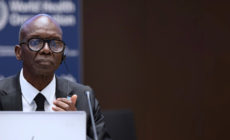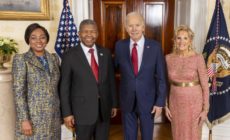Africa moves to halt $50bn loot by multinationals
- Posted on
- Comment
 The African Union (AU) has constituted a consortium made up of experts to draw up modalities to halt Illicit Financial Flows (IFFs)
The African Union (AU) has constituted a consortium made up of experts to draw up modalities to halt Illicit Financial Flows (IFFs)
out of the African continent orchestrated by multinational companies, which is estimated at over $50billion each year.
In Ghana, for example, two separate research works conducted by ActionAid Ghana and Tax Justice Network estimate that Ghana loses between $1.2 billion and $2.2 billion annually through IFFs.
Dr Anthony Mothae Maruping, Commissioner for Economic Affairs of the African Union Commission (AUC), who announced the setting up of the consortium at a media briefing, could, however, not give timelines as to when the consortium is expected to complete its work for implementation to commence.
He was addressing the media on the sidelines of the ninth Joint Annual Meetings of the African Specialised Technical Committee Meeting of the Ministers of Finance, Monetary Affairs, Economic Planning and Integration and the United Nations Economic Commission for Africa Conference of African Ministers of Finance, Planning and Economic Development at Addis Ababa, Ethiopia.
Africa requires $90 billion annually to resolve its infrastructure gap, and, therefore, blocking the over $50 billion loot constitutes more than half of the money Africa needs to bridge the infrastructure gap.
As part of ongoing strategies to put the modalities to fight IFFs on the international arena, Dr Maruping said a delegation was in UN Headquarters, New York, where it briefed the UN Joint Meeting on Economic and Social Council on the negative impact of IFFs and how Africa plans to correct it.
According to him, Mr Thabo Mbeki, who led the High Level Panel that produced the report on IFFs, also visited the UN headquarters in New York and Washington to push the agenda.
He announced that Mr Mbeki will this month visit Europe to continue to campaign to end IFFs.
ActionAid International key messages at The African Development Week 2016, Addis Ababa, Ethiopia:
1. Africa’s commitment to Agenda 2063 and the SDGs cannot be reached without adequate resources to fund Implementation, Monitoring and Evaluation of the two agendas. Without financing, the hopes that Africa’s most vulnerable people have for a world free from poverty and inequality cannot be realised. Tax is the most sustainable and reliable source of financing and wealth redistribution that states have in order to fulfil their obligations.
2. Report by the High Level Panel on Illicit Financial Flows (AU/ECA HLP) from Africa, commissioned by the AU/ECA Conference of Ministers of Finance, Planning and Economic Development, indicates that Africa loses more than $50 billion annually through illicit financial flows, whilst the African Union Commission and the Economic Commission for Africa (AUC-ECA) estimates that $246 billion additional financial resources is required to halve poverty and inequality simultaneously. This means that losing US$50 billion annually to Illicit Financial Flows (IFF), which could be used to finance critical development projects, furthers poverty and inequality in Africa.
3. Tax dodging by multinational companies deprives the world’s poorest countries of at least $100bn in revenue a year. This is money that is desperately needed to pay for schools, hospitals and the other essential public services that will help eradicate poverty and tackle hunger. It is the world’s poorest and most marginalised people, mainly women and children, who ultimately pay the price for tax dodging.
4. To a large degree, tax dodging is made possible due to the current global tax rules. These rules are determined almost exclusively by the rich and powerful nations with no regard for African countries. African countries need to begin to act on their own accord. ActionAid is calling on African Ministers of Finance, Planning and Economic Development to implement policies that will curtail tax dodging in Africa.
5. Strong institutions and reliable structures such as audits and financial intelligence units that are well resourced with human, technological and financial capacity to effectively track and report on IFFs are needed.
6. Increasing transparency and information management across the continent; frequent reporting and analysis of impact of IFF; collaboration amongst financial reporting authorities and creations of platforms for information sharing on financial transactions amongst multinational corporations; strengthening capacity of civil society and other stakeholders; enactment of complementary laws that protect whistle blowers across the region; and the establishment of mechanisms to retrieve, store and track information flow to enhance security and integrity of data so as to limit unsolicited access that can damage information resources are required for effective tracking of IFF.
7. Unnecessary tax giveaways given to businesses result in the loss of billions of dollars from Africa. This additional revenue could be used to fund education, provide healthcare and develop infrastructure, benefiting millions across the continent. We urge the African Ministers of Finance, Planning and Economic Development to redouble their efforts towards putting an end to harmful tax practices that cause illicit financial flows and the haemorrhage of domestic resources from the continent. Regional integration and co-operation on tax matters can greatly strengthen tax collection, prevent illicit financial flows and hinder a race to the bottom due to harmful tax competition between African states. Continental action and unity is indispensable in the fight to curtail illicit financial flows.
8. Sub-Saharan African countries are giving away their taxing rights through signing very restrictive binding tax treaties with other countries. Treaties often ensure that corporate cash flows untaxed from poorer to richer countries, worsening global inequality and poverty. Women and children pay the price when key public services like hospitals and schools are starved of possible funding. We thus call upon Africa’s policymakers, particularly the Ministers of Finance, Planning and Economic Development, to undertake regular impact assessments of tax treaties and subject them to far greater public and parliamentary scrutiny.
9. Tackling tax dodging effectively requires African countries to address the problem of capacity and accountability in treaty drafting and negotiations as well as having the right incentive regime. The capacity enhancement should target the technical agencies, i.e. the ministry of finance, planning and economic development and the revenue authorities as well as the legislative authorities.
10. Given the vital and positive role of civil society organisations (media, non-governmental organisations, academia and think-tanks) in efforts to curb tax dodging, it is essential that they should be given the operating space and legal freedoms required for advocacy, activism and research in this area.
From Elvis DARKO, Addis Ababa – Ethiopia (Courtesy ActionAid)










 (Selorm) |
(Selorm) |  (Nana Kwesi)
(Nana Kwesi)